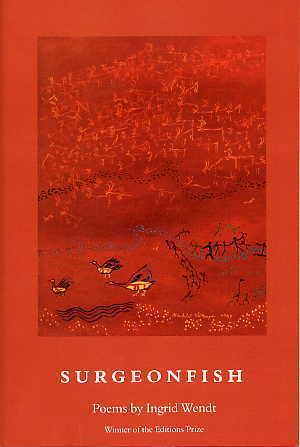Surgeonfish

Winner of the 2004 Editions Prize. Wanderings through the world, through history, through the heart: these are the travels undertaken by Ingrid Wendt in her newest collection, Surgeonfish. As always, Wendt’s ambitions and formal range are large, and her poems are equal to the task.
“Ingrid Wendt’s new book is gypsy music of the most adventurous kind. At times yearning, at times intense and joyful, at times grieving, these poems move from locale to locale — Oregon, Northern Europe, Italy, the Middle East — exploring and celebrating in clear language — the poet’s personal and spiritual roots, singing along the nexus where the human and the natural world kiss and collide.” — Robert Dana
Read a review of Surgeonfish
All books are available, new and used, through your local independent bookstore, online at the usual sites, or from the author here:
Excerpts from Surgeonfish
Mukilteo Ferry
After the long drive north, relentless
the traffic, relentless the heightened news of yet
another alert
after each car, each truck, has clanged
from dock to steel-plated deck and parked,and I get out
to stand at the stern –
light wind, clouds breaking,
and the quaking of tethered engines,
beyond this iron chain the dark water churning –
without warning, the cloak of a great
calm descends upon me, like
the very word
“upon” – the way
it slows the sentence down –
a measured word, hinged – the way
fish, in their inscrutable
expressions, hang
immobile, as though rooted
each to its own place –
and I enter again into the beneficence
of the world of water
whose rhythms will not be hurried
into whose covenant,
under the ancient composure of stars,
we pull anchor and begin to sail.
Italy: Singing the Map
Varenna, Ravenna, Verona: listen!
Each day the same call for vespers, the same
church bells–five, or six, or seven–shifting
places and rhythm, the way each name
(Carerra, Ferrara, Volterra) can be
rung like a chord–dominant, tonic,
subdominant–each village diocese
superimposed over the lake. Phonics
(Bellamo, Milano, Lugano) like beads
on a rosary; hallowed, the sounds the tongue
makes of experience, echoing. One needs
practice, though, and alertness. What
if Augustus (Assisi, Brindisi, Frasassi)
had tried to exchange Ichia for Carpi,
instead of Capri? What if you, trying
to get to Merano, its castle, started
out for Murano? You (Cortona, Cremona,
Crotone) would enjoy the museum of glass.
Perhaps it’s the same as with fauna
and flora: that one subtle accent–
glossy or dull black cap (Arezzo,
Tremezzo, Bomarzo)–telling us Marsh Tit
or Willow Tit. Hidden, the presence
of gills distinguishing Amanita
from Puffball. It’s serious business,
this verbal bouquet: each village, each town
(Geranium, Chrysanthemum, Delphinium)
proud of its own unique chromosomes.
Each village, each town, a place (Laglio)
that just might (Menaggio) try to elope
with your heart (Aureggio). Learn to
sing its name. Love it well (Bellagio).
Even the Stones Have Names
Here is where we live, I’m pointing (Harald
translating). Mountains, here where it’s green,
east and west of our city, no more than an hour’s
drive to go skiing, or to the beach, and Eugene
has just about everything: opera, ballet, health
foods, tofu (all week I’ve been planning this scene),
and here is Tucson. My mother lives in Tucson.
Here in Arizona. (I’ve brought the map with me,
pictured this route to sharing our lives, in Finnmark;
something to offer Harald’s mother, Kristine.)
Three days by car, to Tucson, it’s that far away.
But she was born in Michigan. That’s even
farther. My sister’s in upstate New York.
And here is Illinois, the place I’d dream of,
if I dreamed of home. I grew up in town,
and Ralph, on an Iowa farm his sister’s keeping
going. Our daughter’s in Italy, working.
She’s fine. We try not to worry. This scene,
just as I envisioned, back home in Eugene.
But something else has been added–our week with Harald
and Britt, with Kristine–and without warning, between us,
invisible, swaggering, there for all of us
to see, that old assumption: it’s natural, leaving
behind our family, our home. Yesterday Harald took us
past the birches he used to get lost in–between
his mother’s house, where he was born, and the house
his father’s brother built (now his own)–green
leaves deeper than green, full of midnight
sun, and a tangle of flowers I’d never dreamed
survived here–took us down to the river to fish.
Past the place the German army, retreating,
burned the turf hut where his mother was born.
Past the salmon nets–all those centuries leaning
into the current, rows of wooden poles
bedded in Sami tradition–and past the creeks
whose mouths on the Tana have always offered fish
whose names Harald told us, and told us, Here
in Tana, even the stones have names. Yesterday,
the sun on our backs, with Harald and Aslak and Siri,
the sun off-center, each moment was full of forever.
This map was a way I thought we’d meet each other.
This map is a stone in my heart.
Canon
Close as a secret
Jones Hole Fish Hatchery keeps between
itself and shores of Green River,
there’s a canyon tucked under a sky so high only one
red wall at a time sees sun.
Last week, five hours the only human around,
I followed that course: Jones Creek eternally
baptizing watercress; cottonwoods’ gold
confessing my feet; my soul expanding,
expanding, no words
could have contained it.
No echoing nave.
No dome.
The trail register asked for remarks.
“Beautiful,” “Great,” “Stupendous,” some said.
“Better than Zion, without the crowds.”
It was time to go home. Yet one
caught the last of the sun:
“All this earth, and
I, a creature on it.”
Benediction ringing
each step back to the car.
Company, all that long drive back to town.
Nature photographs and written content © Ingrid Wendt, unless otherwise cited.